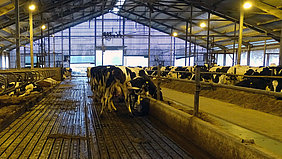What are the challenges and tasks for science, politics, industriy and agriculture? In the recently published VDI Roadmap, a team of authors made up of experts from science, industry and agriculture has summarised the challenges for animal husbandry in the future.
The digital transformation has long since arrived in livestock farming and will continue to bring about change. To what extent can technology and digitalisation effectively support the implementation of social and production-related requirements for animal husbandry such as sustainability, animal welfare, emission reduction and energy efficiency?
The "Technology for sustainable animal husbandry" working group in the VDI Max Eyth Society Agricultural Engineering Advisory Board (VDI-MEG) has drawn up a roadmap for the associated challenges and tasks for future animal husbandry.
ATB expert Prof. Dr. Reiner Brunsch is part of the team of authors, which comprises experts from science, industry and agriculture.
The team of authors takes a look at the future of livestock farming. What are the tasks that science, politics and the economy will have to face? How can the numerous conflicting goals that inevitably arise in technological developments be reconciled in the interests of sustainability? What factors can advance innovation? Experience shows that new technologies usually emerge from joint activities between science, industrial companies and agricultural enterprises. What possibilities are there for fruitful co-operation between the players? And last but not least, how can the dialogue with politics and society be improved, especially with regard to the opinion-forming media?
The VDI-Roadmap „Agriculture Technology 2030 - Strategic Research Agenda Part 2: Technology for sustainable animal husbandry" was published in September 2023.
The document (in German) is available free of charge at the following link: https://www.vdi.de/ueber-uns/presse/publikationen/details/agriculture-technology-2030-technik-fuer-eine-zukunftsfaehige-tierhaltung-teil-2
Publication:
Benz, B.; Bernhardt, H.; Brunsch, R.; Büscher, W.; Dammann, M.; Käck, M.; Schick, M.: VDI-Roadmap "Agriculture Technology 2030 - Strategische Forschungsagenda, Teil 2: "Technik für eine zukunftsfähige Tierhaltung". Verein Deutscher Ingenieure e.V. Düsseldorf, 2023, (ISBN 978-3-949971-63-1, E-ISBN 978-3-949971-64-8), 48 S..
The VDI Association "Technologies of Life Sciences“ (VDI-TLS) is the organisational framework for the specialist areas of "Agricultural Engineering", "Bionics", "Biotechnology", "Biodiversity/GMO Monitoring/Risk Management" and "Medical Technology".
The „Max-Eyth-Gesellschaft Agrartechnik“ sees itself as a driver of scientific and technical progress in the community. Experts from industry and science, administration and agricultural practice are closely associated with it. Voluntary work is carried out in specialised committees and working groups. The current state of science and research is presented and discussed at specialist conferences.

